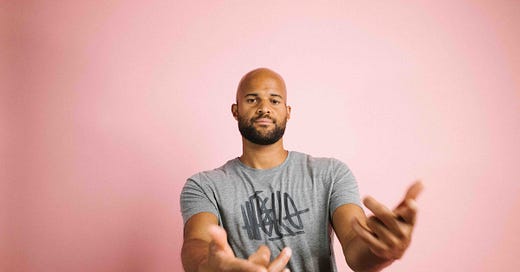Very Glad, Very Grateful: An Interview With Homeboy Sandman (Part I)
Trying to kick some knowledge with the Boy Sand
The Boy Sand
Every rapper thinks they’re still champion, and Angel Del Villar II, d/b/a Homeboy Sandman, is no exception. But most rappers do not have ten good records, which is a low estimate for the tirelessly prolific MC, who’s released a stunning array of albums, EPs, collaborations, and mixtapes of unusually high strength for nearly two decades. Some highlights: Kindness for Weakness, First of a Living Breed, personal favorite concept-mini Subject: Matter, Hallways, the surprisingly confrontational Don’t Feed the Monster. Start with those, which encompass more material than most artists’ entire careers, and don’t skip his Lice EPs with Aesop Rock either. They’re all the more impressive considering the Queens-based 43-year-old is somewhat of a traditionalist, definitely opinionated, occasionally hopelessly male as is the genre’s wont, quite into God, and adheres to the boom-bap of his youth sans Auto-Tune, trap 808s, or drill basslines. Cranky dudes this vocal about their dislike of the Internet are not typically compelling artists, much less rhymers.
But the Boy Sand is almost as great a listener as he is a talker, particularly evident on his recent mixtapes I Can’t Sell These and I Can’t Sell These Either, which proffer musically varied thefts from Sault to Black Moth Super Rainbow. He makes a real case for a point of view that’s closer to your parents’ than your kids’ because he’s so funny, trenchant, versatile in his wordplay, conversational in his verses, and thoughtful enough to make his bullheaded moments some of his most purely fun songs. Because he never stops, it’s always a good time to interview him. RIOTRIOT spoke with Homeboy Sandman via phone about how he defines success, protecting kids from “trash,” and his secret vice: State Property-era Roc-a-Fella bangers.
You’re not a rapper who chases hit singles but you’re also not making, like, impenetrable avant-garde opuses. So a song like “Not Really” makes me curious: How do you define success? Do you feel like you’re, oh, 60% to where you’ve always wanted to be? 100?
I think happiness ties into it a lot. Happiness and connection to God is how I define success. So I would say today I'm exactly what I'm supposed to be, very happy. Very blessed, very grateful. You mentioned I don't chase hits, then you brought up “Not Really.” I mean, if everybody heard “Not Really,” it would be a huge hit. I'm not gonna act like people get to decide what the hits are. The people who hear my records think they’re hits, though.
And that song was over a decade ago, so do you still feel like you’re able to live your best life, after COVID and ticket price hikes and Spotify’s monopoly?
Yeah, yeah. I ain’t worried about that stuff. I know a lot of people have gotten hip to me through Spotify. Which is of actual value. I ain’t sweating no ticket prices or whatever else. I feel better than ever. I'm in the best shape of my life. I'm making the best records of my life. I'm staying healthy. I'm in love.
Absolutely. I lived in Brooklyn for a couple years, and I would see the subway advertisements for Actual Factual Pterodactyl…
Oh, you was around at that time.
And I’d say I’ve probably been a superfan since Subject: Matter and First of a Living Breed. You’re well-known for being prolific and consistent. So I wanted to ask some basic questions to establish what you view as the highs and lows of your musical career, because they’re not immediately apparent to those of us who mostly just eat it all up. What do you view as the defining records of your career so far?
Keep reading with a 7-day free trial
Subscribe to RIOTRIOT to keep reading this post and get 7 days of free access to the full post archives.




